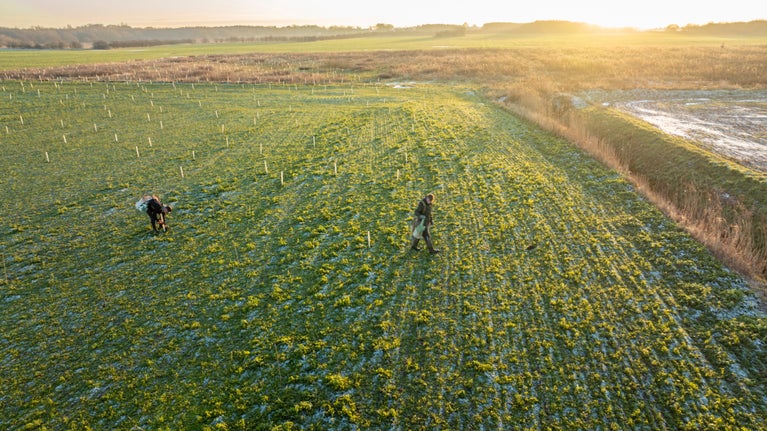
Tackling climate change
Uncover how we’re responding to the changing climate at places in our care.

Harnessing the power of water can be traced back to 200 BC. Hydroelectric power has not only shaped our industrial past – it also has a key role to play in building a greener future. Discover some of the special places that are using this renewable energy source to help reduce our carbon footprint.
Hydroelectric power is a form of true renewable energy that uses the power of water to generate electricity. Water is directed to and flows through a turbine to create power used by a generator to produce electricity.
The hydroelectric scheme at Hafod y Llan farm has been sensitively installed into the rugged Snowdonia landscape. Our scheme at Hafod y Llan generates enough energy a year to power over 610 homes.
Gibson Mill, which was once at the centre of industrialisation, is now at the forefront of the green energy revolution. We've been running this site completely off grid for ten years, along with the mill’s roof-mounted solar panels, its water turbines – which generate energy using the river – provide a significant proportion of the power for the mill and the café.
Find out more about how we're combating climate change at Hardcastle Crags
Sticklebarn's dramatic landscape, forged by fire and ice, is not only beautiful to look at - it also has an important role to play in the creation of renewable energy. The Stickle Ghyll hydro, which was installed in 2015, uses fast-flowing water in the Langdale Valley to power the nearby pub. This means you can enjoy one of the greenest pints of beer in the UK.

Sustainability isn't always about modern engineering and new technology. At Castle Drogo we still harness the power of the River Teign in the same way we did at the beginning of the last century. The castle's first hydo system, installed in 1929, was updated in 2017 to power the visitor centre and heat the house.
The majority of the original infrastructure was found to be sound and reusable. The two turbines were sensitively restored and the concrete pipe which takes water from the weir to the turbine house was still in good condition.
A new intake screening system was installed, which will ensure that fish and eels can't enter the turbine system. A new cable was also installed to bring the power directly to the visitor centre.
The refurbished turbines were commissioned in late October 2017 and have been generating electricity ever since, as long as there is sufficient water in the River Teign.
The electricity is used by the visitor centre and any excess is used to pre-heat water for the castle heating system, reducing the amount of biomass required and ensuring none of the power is wasted.
Discover more about hyrdroelectricity at Castle Drogo
A water screw, known as the Archimedes Screw, has reinstated hydroelectricity to Cragside, which was also the first known house in the world to have used this form of power. This project continued the work of previous owner, Lord Armstrong, who used water from the lakes on the estate to generate electricity to light the house in 1878. The modern hydro system will produce enough energy to light all 350 light bulbs in the house.
Water to power the screw comes from Cragside’s Tumbleton lake. As water flows from the lake (the lowest of five on the estate) into the burn below, it passes through spiral blades causing the screw to turn. The energy is then converted into electricity using a generator.
Our renewable energy projects reduce our dependence on fossil fuels and our impact on climate change. What's more, the money we save by being more energy efficient goes towards vital conservation work that protects the countryside and the wildlife that depends on it.
This ensures that the special places in our care will remain beautiful and full of life for future generations to enjoy.

Uncover how we’re responding to the changing climate at places in our care.

From tips on saving water to combatting plastic pollution, learn more about our work to protect precious coasts and rivers for wildlife and people, and what you can do to help.

Discover more about the National Trust’s role at COP26 in Glasgow and how you can help tackle the climate crisis.
Find out how we're planting and establish 20 million trees that will absorb carbon and help tackle climate change.

With support from the Government’s Green Recovery Challenge Fund, we're looking for ways to protect our environment and combat climate change. Find out more about the work we're doing.

Discover how some of the special places in our care are harnessing the power of the sun to generate electricity and reduce their carbon footprints.

Using heat pumps to provide greener energy at the places in our care, from castle gardens to historic mansions, is helping to reduce our carbon footprint.

Discover how biomass boilers are being used by some of the special places in our care to provide heat and hot water whilst also reducing their carbon footprint.